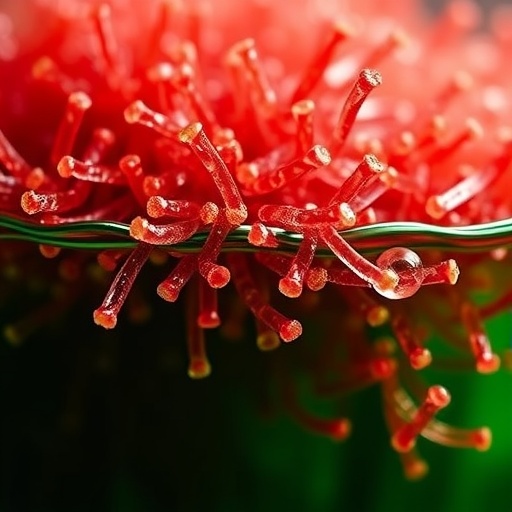In recent years, the pursuit of sustainable energy sources and high-value compounds has increasingly placed microalgae in the limelight. Microalgae, known for their fast growth rates and ability to synthesize various bioactive compounds, present a compelling case for biorefinery approaches. A novel study conducted by Venkatachalam and colleagues sheds light on a critical aspect of microalgal processing: cell wall disintegration and its pivotal role in enhancing the extraction efficiency of fucoxanthin, a valuable carotenoid pigment.
Fucoxanthin is a unique carotenoid predominantly found in brown algae and diatoms. This particular compound is gaining significant interest due to its numerous health benefits, including anti-inflammatory, anti-cancer, and anti-obesity properties. However, the commercial extraction of fucoxanthin from microalgae has been hindered by the robust and complex structure of algal cell walls. This study emphasizes the importance of developing effective methods to break down these cell walls, thus facilitating the release of fucoxanthin and improving overall extraction yields.
The research team sought to explore various disintegration techniques and their impacts on the cell walls of different microalgal strains. Focused on improving efficiencies, they evaluated methods such as mechanical disruption, enzymatic hydrolysis, and chemical treatments. Each method presented unique advantages and potential drawbacks, raising questions about the best strategies for maximizing yield and preserving the integrity of the valuable compounds being extracted.
Mechanical methods, for instance, showcased a rapid disintegration process yet often resulted in the degradation of fucoxanthin and other sensitive compounds. On the other hand, enzymatic treatments offered a more controlled approach, allowing for the selective breakdown of cell wall components without significantly compromising the integrity of the target compounds. This balance between efficiency and the preservation of bioactive compounds is crucial in developing emerging applications for fucoxanthin in food and nutraceutical industries.
A critical finding of the study was the differing susceptibility of various microalgal strains to each disintegration method. For example, some species exhibited robust resistance to mechanical disruption, necessitating a more nuanced approach that combined different methodologies for optimal results. Furthermore, the study highlighted how understanding the biochemical composition of the cell walls is essential for tailoring disruption techniques to specific strains, ultimately leading to more efficient extraction processes.
In addition to the exploration of extraction efficiency, the research tackled the broader implications of cell wall disintegration on the sustainability of bioactive compound production. The study proposed a shift towards a more integrated approach that not only focuses on extraction but also emphasizes the entire production process, from cultivation to final product. By leveraging biotechnological advancements and understanding the microalgal life cycle, researchers can develop more sustainable methods of using microalgae as a renewable resource.
Furthermore, the statistical analysis presented in the study demonstrated the significant influence of disintegration techniques on fucoxanthin yield. The team employed various metrics to assess the efficacy of each method, ultimately identifying a combination of approaches that maximized extract yield while minimizing potential losses due to degradation. These insights are pivotal for stakeholders in the biomass industry seeking to optimize product formulations and enhance economic viability.
This pioneering research does not merely stop at theoretical findings; it opens up discussions on practical applications. The implications of enhanced fucoxanthin extraction extend to various sectors, particularly in developing innovative functional foods. As the global demand for natural health products continues to rise, efficient extraction methods will be essential in making fucoxanthin more accessible on the market.
Thus, the intersection of microalgae bioprocessing and biotechnology can lead to revolutionary changes in how we extract and utilize plant compounds. This study serves as a building block for future research into scalable and sustainable methods for harvesting bioactive compounds from microalgae. The insights garnered from exploring cell wall disintegration may very well pave the way for new innovations in how we approach natural product extraction, underscoring the importance of biological research in addressing global challenges.
As industries move towards greener solutions, the integration of microalgae into mainstream products can significantly contribute to environmental sustainability. The findings presented in this study not only promise to improve extraction efficiency but also align with global goals for reducing carbon footprints associated with traditional agricultural practices. The role of microalgae as a functional food source positions it as a potential game changer in the quest for sustainable, health-oriented food systems.
In conclusion, Venkatachalam and colleagues’ investigation into cell wall disintegration provides a valuable perspective on the complexities of microalgal extraction. With further research and development, the techniques highlighted in this study could transform the commercial landscape for fucoxanthin and potentially other crucial bioactive compounds. By marrying technology with biological processes, researchers are poised to unlock the myriad benefits hidden within microalgae, setting the stage for a healthier, more sustainable future.
Global interest in the applications of fucoxanthin and microalgae undoubtedly highlights the systematic challenges that remain. The path forward will require collaborative efforts across disciplines, incorporating robotics, informatics, and biochemistry. The innovative approaches to algal cell wall disintegration could eventually lead to advancements that not only enhance extraction techniques but also revolutionize global agricultural practices.
To conclude, the research undertaken highlights the intricate balance between efficacy and sustainability in microalgal processing. As we inch closer to a more sustainable future driven by innovative approaches to food production and nutrient extraction, the study by Venkatachalam et al. underscores the vital role of scientific exploration in revolutionizing industries and embracing the full potential of nature’s bounty.
Subject of Research: Cell Wall Disintegration in Microalgae
Article Title: Cell Wall Disintegration in Microalgae: Implications for Efficient Fucoxanthin Extraction
Article References:
Venkatachalam, S.K., Fareed, M., Duraisamy, N. et al. Cell Wall Disintegration in Microalgae: Implications for Efficient Fucoxanthin Extraction.
Waste Biomass Valor (2025). https://doi.org/10.1007/s12649-025-03354-5
Image Credits: AI Generated
DOI:
Keywords: Microalgae, Fucoxanthin, Cell Wall Disintegration, Extraction Efficiency, Sustainable Biomass
Tags: anti-inflammatory properties of carotenoidsbiorefinery approaches using microalgaebrown algae carotenoidschallenges in fucoxanthin commercial extractionchemical treatments for cell wall breakdownenzymatic hydrolysis for algal processingfucoxanthin extraction methodshealth benefits of fucoxanthinimproving extraction yields of bioactive compoundsmechanical disruption in microalgae extractionmicroalgae cell wall disruption techniquessustainable energy sources from microalgae





